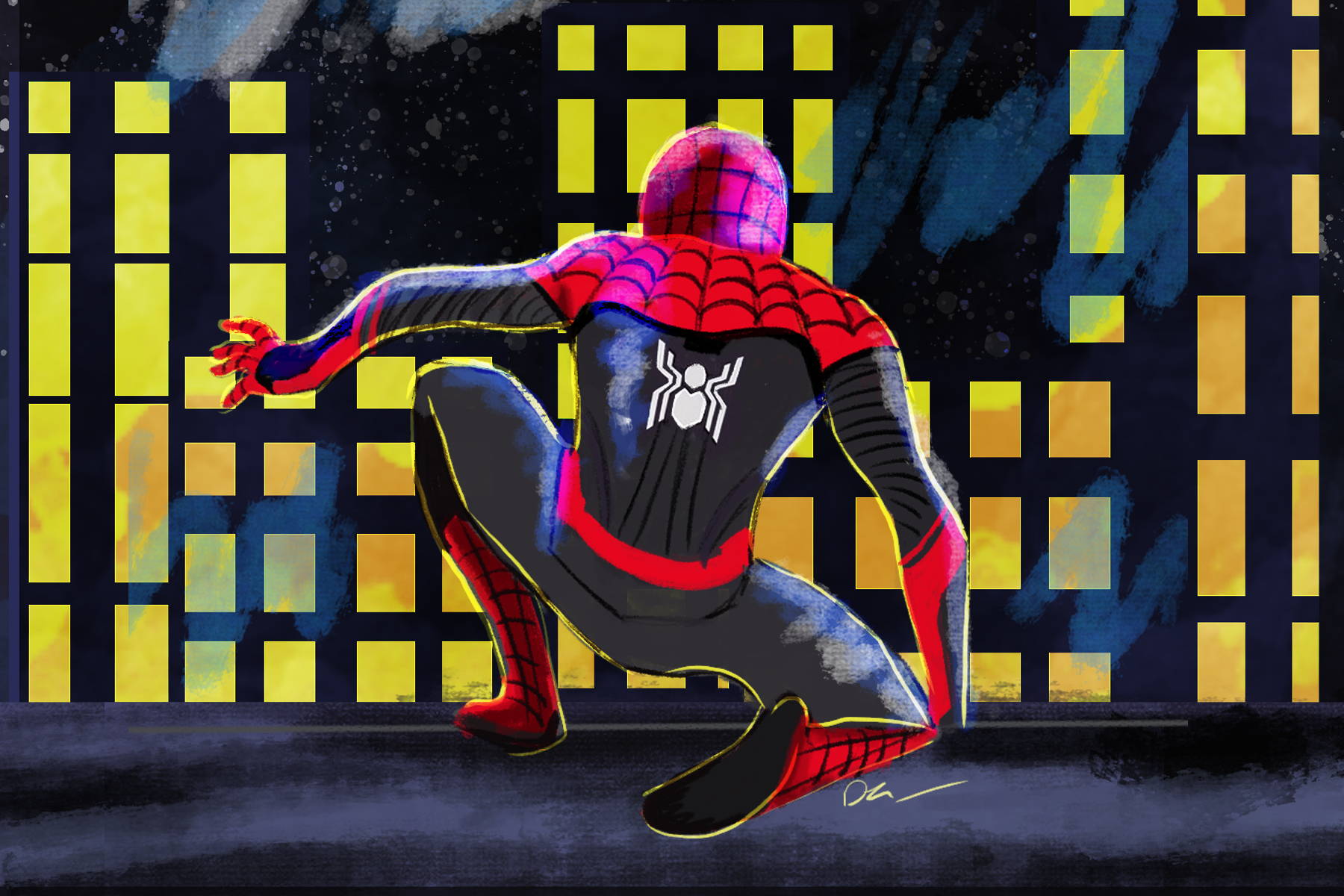“Spiderman: Far From Home” has the burdensome task of following “Avengers: Endgame,” which resolved the Marvel Cinematic Universe (MCU) narrative, grossed massive box-office dollars and stands as a cultural phenomenon. Since “Avengers: Endgame” finishes the stories of the MCU’s most prominent characters, like Iron Man, anxieties that Marvel might stumble down the path to mediocrity after reaching such acclaimed heights might be warranted.
Fans and critics placed high expectations on the follow-up to “Endgame” to see if Marvel’s next entry could continue the quality. “Spiderman: Far From Home” works in part because the film does not attempt to live up to “Avenger’s Endgame,” instead creating a project with an entirely different, PG-rated tone. Similarly, Peter Parker struggles to live up to his now deceased heroic father figure, Iron Man.
“Far From Home” succeeds in continuing the narrative as the film integrates story elements from previous Marvel movies into Peter Parker’s new adventure. While other Marvel films, such as “Thor: The Dark World,” exist on the periphery of the MCU — taking the phrase standalone too far — the Spiderman sequel balances this delicate process perfectly.
Fangirl darling Tom Holland and the filmmakers’ clear understanding of the character of Peter Park anchors “Far From Home” in this precarious state.
Parker, played by Holland, acts as a conduit so that the audience can insert themselves into the story. The nerdy teenager is asked the same questions as the audience: how does humanity move on from the death of its main heroes, like Iron Man, and reconcile with the trauma caused by the events now known as “the blip”?
A strength of “Far From Home” lies in the connections the film has to the rest of the MCU. So rather than ignoring the post-“Endgame” questions and telling an isolated story, the movie takes them head-on.
Peter mourns the death of Iron Man and reckons with the realities of Thanos blipping him out for five years, like the audience does. However, following the serious tone of “Endgame,” the follow up switches to the mood of a PG teen rom-com, answering the questions facing the Marvel franchise in a humorous — and most importantly — brief way.
Rather than dwelling on the trauma “Endgame” presents, “Far From Home” uses its whimsical tone to resolve these plot points with brief hilarious cuts of students blipping in and out of a basketball court while a poorly student-made TV program plays being sufficient enough.
The latest Spiderman movie reduces the drama to a personal story about Peter Parker. The most important legacy of the final Avengers movie, “Far From Home,” is the impact that the fight against Thanos has had on the teenager.
In theaters July 5. #SpiderManFarFromHome 🕷️ pic.twitter.com/K3xfXuqk3D
— Sony Pictures (@SonyPictures) January 15, 2019
Unlike in “Homecoming,” all Peter wants now is a break from being an Avenger. The quest is now to be a normal teenager so that he can profess his feelings to his crush M.J. Peter wants to be the friendly neighborhood Spiderman rather than the Iron Man-esque hero the world demands.
“Far From Home” is at its best when it tells the story of Peter Parker through Spiderman. Parker as Spiderman laces every superhero action with teenage awkwardness, as the adolescent worries about pleasing M.J. while fighting Mysterio. The protagonist’s — and movie’s — ultimate goal is to get the girl and live life. Not save the world.
“Far From Home” is at its best when the protagonist goes up against everyday obstacles every teenager faces, making the audience relate to Parker so they are behind the mask when the webs start slinging. The new Marvel film is a deeply human story, not a superhero movie, which works in its favor because it could never up the stakes after “Endgame.”
“Far From Home” also proves, like Parker, that Marvel can exist without Iron Man.
The audience believes that they are watching an inferior film with a seemingly bland and generic first half. It feels like a dud until it surprises the audience, revealing that the first half is purposefully predictable, explaining that Mysterio is the actual villain who had staged the previous fights against apparently fake elementals. Mysterio, who portrays himself as a hero, lies about a world-threatening crisis to earn the trust of Peter so that he could obtain Stark technology.
“Far From Home” fakes the audience out on Marvel’s future, creating speculation that the next phase of the MCU will be defined by multiverses, a feature prevalent in the comics. When the movie reveals that the multiverse plotline is a mere ploy by Mysterio, Marvel elevates itself above other movie franchises.
The ability to manipulate the audience’s expectations of the superhero genre to create a satisfying twist and an entertaining film shows how those in charge at Marvel understand the wants of their audience perfectly. Marvel understands how to please moviegoers better than any other franchise right now, with a formula that has been refined to perfection. Marvel has proven itself a studio to be trusted in starting a new phase of the MCU.
Yet, Marvel still has a lot of work to do. Clearly, “Spiderman” works with audiences, as does “Black Panther” and “Guardians of the Galaxy.” Newer additions such as Captain Marvel, who is at the center of the next phase of MCU films, and plot points relating to the Skrulls have not resonated with fans or critics as strongly yet.
Can Marvel continue to strike gold and entertain audiences by developing newer stories? Many believed that creating an ensemble film with four superheroes was impossible until Marvel defied the odds by adding more characters to its ever-expanding universe.
Now Marvel has the daunting task of creating the same feeling among audiences all over again. “Spiderman: Far From Home” shows that both Parker and Marvel are ready to move on from the legacy of Iron Man and the Avengers to embark on a new phase of films.
















